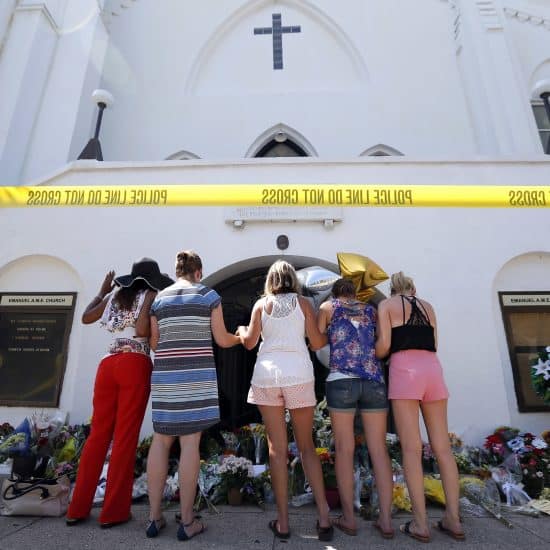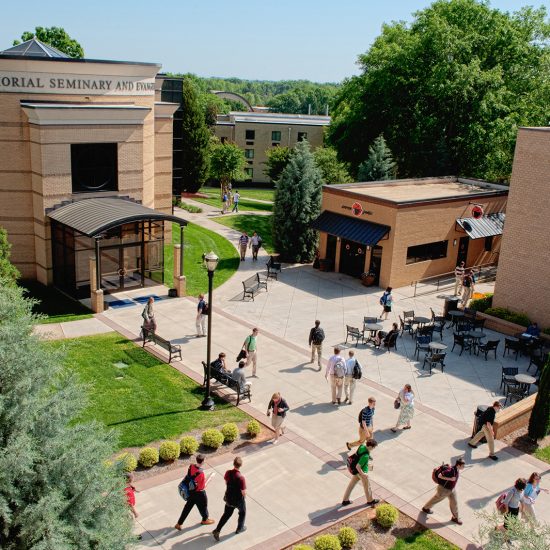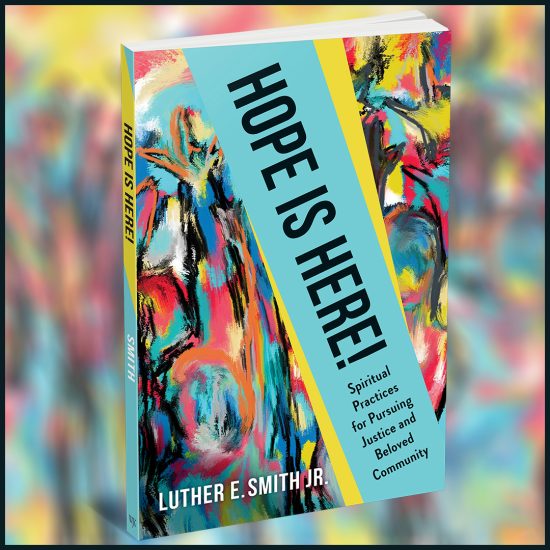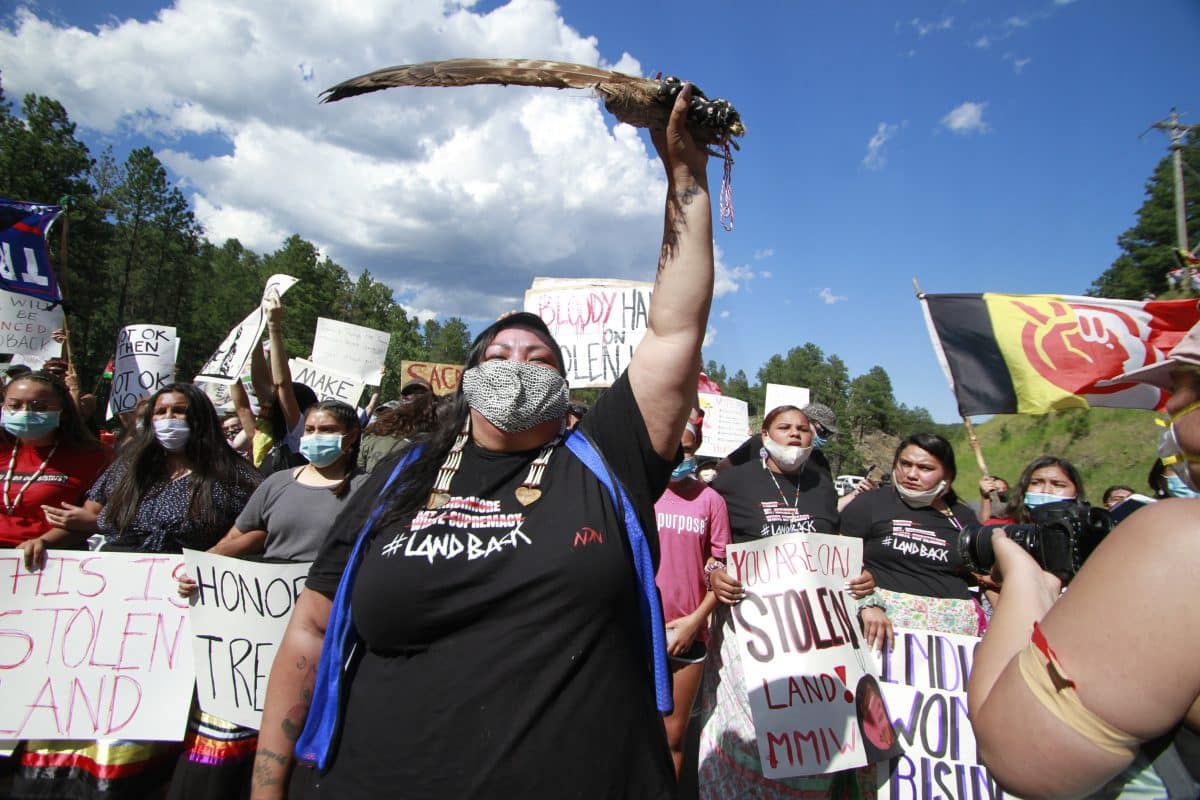
(RNS) — Over Fourth of July weekend, President Donald Trump stoked racial tensions yet again when he held an Independence Day rally in South Dakota. Native leaders called for Trump to cancel the rally, and more than a dozen Indigenous activists and allies were arrested for blocking a highway leading to the event.
And yet, Trump came, uninvited, to unceded Lakota territory. He arrived at the Six Grandfathers, known also as the sacred Black Hills, where he paid homage to Mount Rushmore, a national monument carved into the hills by a man with ties to the Ku Klux Klan.
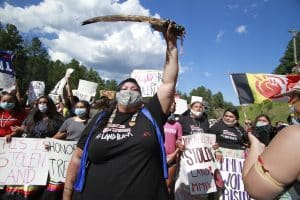
Native American protesters demonstrate in Keystone, South Dakota, ahead of President Donald Trump’s visit to the memorial July 3, 2020. (Stephen Groves/Associated Press)
Among the detained activists was Nick Tilsen, president of the NDN Collective and a citizen of the Oglala Lakota nation. In explaining the religious significance of the Mount Rushmore site for Native communities, Tilsen said that “more than 50 different Indigenous nations actually have origin stories or ties or spiritual connections to the Black Hills” and that U.S. law has recognized the Lakota nation as the rightful caretakers of that land.
This may seem like a strange perspective, and until Trump’s appearance, I, like many of you, considered Mount Rushmore as nothing other than a symbol of American patriotism.
What we are also failing to see, though, is that there is nothing exceptional about what Trump did: It fits right in with the long history of racist abuse that arrived with European colonists.
On May 4, 1493, just a year after Christopher Columbus arrived in the New World, Pope Alexander VI issued the Papal Bull “Inter Caetera,” which announced that any land not inhabited by Christians was open to be “discovered” by Christian rulers and that “the Catholic faith and Christian religion be exalted and be everywhere increased and spread, that the health of souls be cared for and that the barbarous nations be overthrown and brought to faith itself.”
This document, which would come to be known as “The Doctrine of Discovery,” was foundational to the European colonization of the Americas and their presumptive claims of western expansion (termed “Manifest Destiny”).
While some ask what religion has to do with American racism, attending to its conquest and colonization seriously compels us to ask a different question: Is it even possible to decouple religion from American racism?
For the purposes of this question, let us understand racism through the lens of Ibram Kendi, a leading scholar of race and anti-racism, who describes racism as “a marriage of racist policies and racist ideas that produces and normalizes racial inequities.”
The Doctrine of Discovery offers a helpful example of how racist ideas of supremacy over Indigenous peoples included our religious authorities, whose own biases were used not only to justify but sanctify the seizure of occupied lands, the physical removal of communities to undesirable reservations, and systematic violence of genocidal proportions.
And in case you are tempted to think such racist policies and racist ideas are quaint misconceptions of a distant past, let me be the first to tell you that they remain alive and well. The U.S. Supreme Court upheld the Doctrine of Discovery in Johnson v. M’Intosh in 1823, which stands as a basis of international law to this day, and of United States Indian Law: Just 15 years ago it was cited in the case of City of Sherrill v. Oneida Indian Nation of New York, which concerned the Oneidas’ ability to reacquire reservation land that had been sold in the early 19th century.
Until very recently, we Americans seemed to think similarly about all our racist structures: as part of a past that no longer pertained. We had ended slavery. We had ended Jim Crow. We had no further need for the Voting Rights Act. Yet there’s nothing “past” about American racism — it is our present. And it will be our future unless we take radical action to break the cycle of exploitation, violence and lies.
We cannot speak of America’s past racism without attending to our present sustained and targeted oppression of Black people, in which religion has been a driving force in shaping the complementary ideas of whiteness and anti-Blackness.
Settler colonialists honed the idea of race on this continent to justify the enslavement and eradication of nonwhite Christians. This is the underpinning of American racism — and Christianity is at the center of it. Early Christian slaveholders used the Bible to justify the enslavement of darker-skinned people. Vigilante groups terrorized Black Americans as the vigilantes rode around in white hoods with a Bible in hand. Prominent evangelical pastors spewed racist hate against America’s first Black president.
So what do we do once we are armed with the knowledge that religious actors have been complicit in forming and upholding American racism? What might we do to correct for racism?
The answer is not as intuitive as it might seem. Most of us have presumed the solution to be nonracism. By not being actively racist, we figured that we were erasing racism.

Black Lives Matter 757 protesters march on the boardwalk in Virginia Beach, Virginia, July 4, 2020. (Kristen Zeis/The Virginian-Pilot via AP)
What we now know collectively, though, is that when we sit by silently and allow racist ideas and policies to function, we are complicit in racism. Neutrality is neither the opposite of racism nor its solution. As Angela Davis has said, and we have heard repeatedly of late: “In a racist society, it is not enough to be nonracist. We must be anti-racist.” To be anti-racist is to proactively fight against racism in all its pernicious forms, from the individual level to the systemic. Religious actors are equipped to engage anti-racism because it calls on us to examine ourselves within while also engaging with our own communities.
What would it look like to take on the mantle of anti-racism in today’s age?
For one, we must challenge the racist ideas and racist policies that we have normalized and rendered invisible. Because these racist ideas are so entrenched within us, becoming anti-racist is an ongoing process that entails a commitment to constantly searching for weeds and pulling them out by their root.
To live into anti-racism is to strive toward rooting out white supremacy and American exceptionalism in all its pernicious forms and toward humanizing people of different groups rather than creating hierarchies of power and dominance.
An anti-racist, for instance, would be moved to action upon learning of Christianity’s central role in birthing American racism: in seizing sacred sites and land from indigenous communities, in purposefully breaking a treaty that honored those lands and in imposing white Christian nationalism.
Sincerely engaging anti-racism would be a seismic shift from anything we have ever seen in American history before because, up until now, we have been so subsumed by racism and nonracism. That we are beginning to broach the topic of anti-racism more seriously should give us all heart. This is a path toward a better, more humane and more sustainable way forward.

